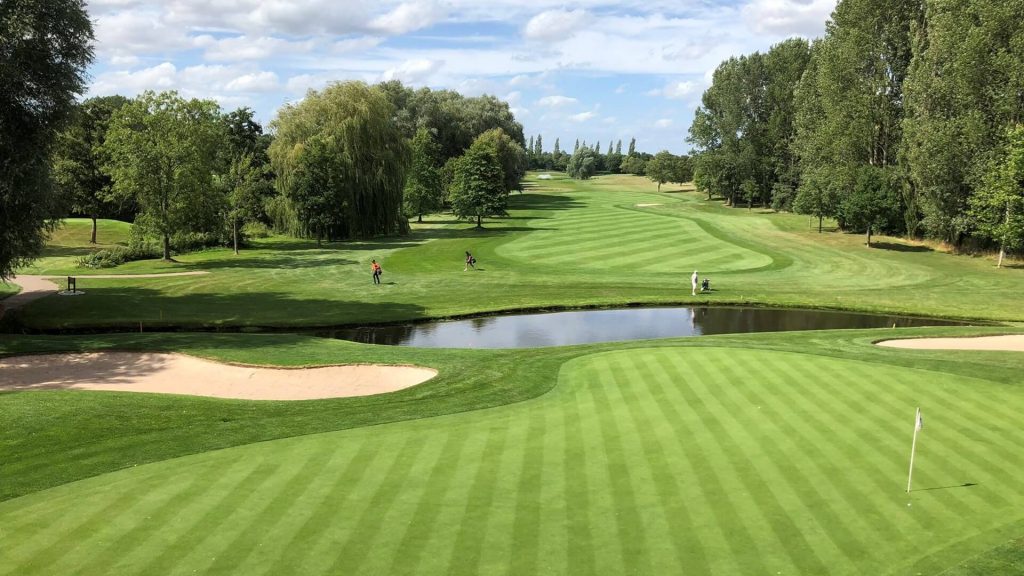The Midlands might not be the first area that springs to mind when one thinks of top-class golf courses, but it’s a hotbed in terms of variety and quality.
Naturally, there are no links courses given the county’s landlocked status, but the myriad of characteristics across golf courses in the Midlands is seriously impressive.
This is our whistlestop tour of the best golf courses in the Midlands.
1. The Belfry

Where else to start than The Belfry? This is one impressive complex—with the 18-hole Brabazon and PGA National courses backed up by first-class practice facilities, an expansive clubhouse and a hotel.
The main attraction is, of course, The Brabazon. This host of four Ryder Cups is always in magnificent condition—fully deserving of its status as one of the best golf courses in the Midlands.
Two holes clearly stand out—the 10th and 18th. The 10th owes much of its fame to Seve Ballesteros, who was the first to drive the green on television.
The 18th is also dominated by water, and, as on the 10th, picking the correct angle is key to success—just ask the several Americans who have come to grief here. It can be conquered, though, as Christy O’Connor Jr proved with a legendary 2-iron, which is commemorated by a plaque on the spot the ball was struck from in 1989.
2. Little Aston
Walking in the footsteps of O’Connor et al. is a huge attraction, but the Brabazon isn’t actually the finest golf course in the Birmingham area (in our opinion)—Little Aston is.
Located a few miles north of the city centre, this course is laid out in mature parkland on the grounds of Little Aston Hall.
It was designed by Harry Vardon in 1908 and is defined by tree-lined fairways leading to its large greens. The 10th and 12th are two standout holes, while the 18th is a fine finish.
3. Hollinwell
Notts, or Hollinwell as it’s known, is laid out in the heart of Robin Hood country and is one of the finest inland courses in Britain.
Outside of Surrey and Berkshire, only Woodhall Spa and Alwoodley spring to mind as notably better than this north Nottingham track.
Hollinwell—which takes its name from the holy well next to the 8th fairway—was laid out by Willie Park in 1887 and later modified by JH Taylor.
The sandy subsoil makes this course drain remarkably efficiently, and the most spectacular holes are probably those which sweep around wooded hillsides—although others may prefer the more open holes lined by heather and bracken.
4. Sherwood Forest
Sherwood Forest is another GB&I Top 100-ranked course in Nottinghamshire, and its name gives a good clue as to its nature.
It’s laid out on heathland, which, over the years, has been populated by birch, oak and pine trees and forms part of Clipstone Woods. Harry Colt set the course down before James Braid later extended it.
You can expect springy turf and a run of par 4s on the back nine from the 11th, which test even the expert golfer.
5. Lindrick
This course has the novel scenario of lying across three counties. The stream behind the 4th green is the point where Derbyshire, Yorkshire and Nottinghamshire all meet. Legend has it that this dell was once an arena for prize-fighting.
It often gets classified as Yorkshire, but the clubhouse sits in Nottinghamshire, making this one of the best golf courses in the Midlands—technically.
Lindrick was the host for one of the few Ryder Cups won by Great Britain & Ireland, when in 1957, Dai Rees’ team claimed the first win for GB&I since 1933 (and the last before the team became Europe).
This hybrid of heathland, woodland and parkland golf is notable for finishing with a par 3.
6. Beau Desert
Moving into Staffordshire, Beau Desert is a gorgeous Midlands golf course that takes its name from the ‘Beautiful Wilderness’ which once existed on this land—once part of the Marquess’ Beaudesert Estate—before Herbert Fowler laid out this gem.
Fowler was a masterful heathland designer, and the rolling fairways here are lined by fir and spruce trees, with heather and gorse in Cannock Forest demanding accuracy off the tee. These narrow, tree-lined fairways offer a feeling of isolation and tranquility.
7. Blackwell
Blackwell is comfortably the stand-out golf course in Worcestershire. In fact, this Bromsgrove course is one of Britain’s elite parklands.
Harry Colt’s design uses its small acreage cleverly here with an array of fine holes showcasing real architectural merit—underestimate it at your peril.
8. Sutton Coldfield
This fast-running course on the northern outskirts of Birmingham city centre was designed among heather and woodland by Alister MacKenzie.
It boasts a variety of holes on sandy, undulating turf and true greens.
9. Enville
Enville is home to two fine courses. The Highgate is a hybrid course whose heathland holes have been there since the 1930s and are top-class, with the woodland phases added later.
The Lodge might be the No.2 course at the club, but it’s terrific, too. This shorter course—with only two par 5s—is also a mix of open heathland and woodland sections.
10. Edgbaston
This Harry Colt course in Edgbaston, Birmingham consists of over 6,000 yards, but with a par of 69 and typical nous from the designer, it has just the right amount of test.
11. Forest of Arden
This course was built in 1970 in a huge estate at Packington Park between Birmingham and Coventry.
It has to be said—Donald Steel did a fine job of working with the mature trees and natural water features which already existed here.
12. The Warwickshire
Opened in 1994, The Warwickshire has 36 holes of championship golf close to Kenilworth and Leamington Spa.
The Kings and Earls courses are situated in the middle of 465 acres of picturesque countryside.
13. Copt Heath
Amateur golf legend Peter McEvoy learnt the game at Copt Heath, which was first laid out by Harry Vardon and then enhanced by Harry Colt, who created over 100 bunkers with his traditional upswept face.
The sandy subsoil gives rise to excellent turf all year round, but the short 13th—protected by bunkers and water—is perhaps the highlight.
14. Whittington Heath
Last but not least—Whittington Heath, in Staffordshire, is one of the oldest golf clubs in England, having originated in 1886 as a nine-hole course.
Its newer course, designed by Jonathan Gaunt following the construction of the HS2 railway line, is one of the best in the Midlands.




